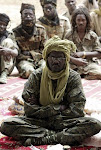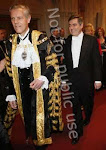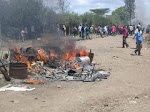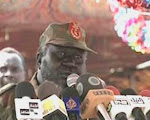The International Criminal Court (ICC) announcement to indict President Omar Hasan Ahmad Al-Bashir, which was mentioned first time in late 2008, was issued on March 4th, 2009. The decision to indict the president created a lot of local and international reactions as well as debates on the ICC's jurisdiction over countries that have not signed the Rome Treaty. The debate on the issue, however, also included the ICC's inabilities and incapability to physically arrest President Al-Bashir or indeed any other president former or otherwise. This article intends to add the author's debate on the ICC’s issue to those that have either been debated or are being debated in the political, legal and social scenes.
Local Scene
On the local scene – that is the Sudanese reaction on the ICC decision to indict President Al-Bashir – two phenomena were imagined or expected could happen by those behind the ICC. The first one is that, they thought that there were to be experienced in the Sudan a popular uprising against the government with a view to toppling it; and the second is that, they thought that the Sudanese Armed Forces (SAF) would overthrow the President of the Republic. Either of this imagined coup d’etat was thought could install a president that would cooperate with the ICC and its allies to arrest the President of the Republic and hand him over to the ICC.
South Sudan
The reaction of the Government of South Sudan (GOSS) on the indictment was unexpected. Led by the SPLM/A, which is a partner of the National Congress Party (NCP) in the Government of National Unity (GONU), GOSS had a moral obligation to back the President of the Republic against the ICC decision. But GOSS’ decision to maintain a non-committal approach to the entire ICC indictment saga and the beefing up of its security in the South could be nothing but precautionary measures on the two phenomena which were expected could happen to topple President Al-Bashir. This is in addition to GOSS leadership’s insistence that President Al-Bashir should cooperate with the ICC and its boycott of most of the ICC Crisis Committee Group Meetings on ICC Indictment, chaired by First Vice-President and President of GOSS.
Northern Sudan
Some opposition parties in the North, including Dr. Khalil Ibrahim’s Justice and Equality Movement (JEM) saw the indictment as a reason to advance their agenda. This agenda was based on the same two phenomena. The Popular Congress Party, led by Dr. Hasan Abdallah Al-Turabi, for example, said that the President of the Republic should cooperate with the ICC. JEM, on the other hand, said it was the ‘legitimate authority to arrest the President’ of the Republic; and angrily reacted by suspending the Doha negotiations, (BBC Arabic Service, March 5th, 2009).
Khartoum Citizens
Local Scene
On the local scene – that is the Sudanese reaction on the ICC decision to indict President Al-Bashir – two phenomena were imagined or expected could happen by those behind the ICC. The first one is that, they thought that there were to be experienced in the Sudan a popular uprising against the government with a view to toppling it; and the second is that, they thought that the Sudanese Armed Forces (SAF) would overthrow the President of the Republic. Either of this imagined coup d’etat was thought could install a president that would cooperate with the ICC and its allies to arrest the President of the Republic and hand him over to the ICC.
South Sudan
The reaction of the Government of South Sudan (GOSS) on the indictment was unexpected. Led by the SPLM/A, which is a partner of the National Congress Party (NCP) in the Government of National Unity (GONU), GOSS had a moral obligation to back the President of the Republic against the ICC decision. But GOSS’ decision to maintain a non-committal approach to the entire ICC indictment saga and the beefing up of its security in the South could be nothing but precautionary measures on the two phenomena which were expected could happen to topple President Al-Bashir. This is in addition to GOSS leadership’s insistence that President Al-Bashir should cooperate with the ICC and its boycott of most of the ICC Crisis Committee Group Meetings on ICC Indictment, chaired by First Vice-President and President of GOSS.
Northern Sudan
Some opposition parties in the North, including Dr. Khalil Ibrahim’s Justice and Equality Movement (JEM) saw the indictment as a reason to advance their agenda. This agenda was based on the same two phenomena. The Popular Congress Party, led by Dr. Hasan Abdallah Al-Turabi, for example, said that the President of the Republic should cooperate with the ICC. JEM, on the other hand, said it was the ‘legitimate authority to arrest the President’ of the Republic; and angrily reacted by suspending the Doha negotiations, (BBC Arabic Service, March 5th, 2009).
Khartoum Citizens
Innocently, the citizens of Khartoum – listening to the strong rumours on the two phenomena – went to the markets on March 3rd, 2009, to stock their homes with food for fear of a coup d’etat. "I for one cannot see a political way out of this mess. The International Crisis Group writes that ‘the NCP is likely to look for a way out of a situation, by changing its policies or leadership. To succeed, it will need to change both.’ This is groping in the dark. What is ICG actually advocating here? It seems to me that it is calling for a coup. An internal coup is possible though unlikely and not, to my mind, a solution. (See this site for more details: http://www.ssrc.org/blogs/darfur/2009/03/05/unchartered-waters/.
Those Sudanese nationals who supported the ICC decision to indict the president, a matter they think could impose a coup d’etat in the country, could be having a number of personal and partisan problems. These problems could likely be represented in the following:
1. Ignorance in differentiating between a threat to the nation and that to the President as a sovereign representative of the nation;
2. Lacking commitment to the country's sovereignty and its integrity;
3. Lacking of political ability to decipher the real intention behind the ICC's decision;
4. Inability to read between the lines and understand that the ICC’s indictment of the president also targets the CPA;
5. Lacking knowledge of how the indictment could, say, by proxy, extend to some of them while in power;
6. False assumption that anyone could salvage anything from the imagined chaos thought would ensue once President Bashir is toppled; and
7. Trying to come to power through such crooked ways as ICC’s imaginary attempt to overthrow the Sudanese president.
Darfur Peace
It’s important to relate the ICC decision to indict President Al-Bashir to its main source, Darfur. Many experts believed that when the ICC threatened to indict the President of the Republic late last year; it were and could/will still work against the peace process in Darfur. This has now appeared to be true. JEM leadership is saying that they cannot talk to an 'international criminal' (a reference to President Al-Bashir by Dr. Khalil Ibrahim, BBC Arabic Service, March 18th, 2009).
This is what those who are pursuing the ICC indictment from within or without Europe want. Because it means prolonging the war in Darfur, and that means raising more funds for Darfur by the NGOs – especially those that were expelled – to continue surviving on the poor people of Darfur as they did sometimes and continue to do with the people of South Sudan..
Foreign Reactions
The powers behind the ICC’s indictment of the President of the Republic were overjoyed on hearing about the indictment. The United States of America (hereinafter referred to as US) said it was committed to peace in the Sudan but those who committed atrocities should be held accountable. "We are strongly committed to the pursuit of peace in Sudan and believe {that} those who have committed atrocities should be held accountable for their crimes." (For more details, please follow this internet link to read more on the foreign reactions on pro and against President Bashir’s indictment by the ICC. http://www.dw-world.de/dw/article/04074769,00.html?maca=en-aa-pol-863-rdf).
The European Union, a US ally, meanwhile, reiterated its full support to the ICC decision to indict President Al-Bashir। It said that, "the EU reiterates its full support and respect for the ICC and its key role in the promotion of international justice". (This statement is found on the same internet link above).
"Russia and China are opposed to the ICC decision to indict President Al-Bashir। The Russian Foreign Ministry spokesman warned that the ICC decision could further destabilize the situation in Sudan. "China, on the other hand, "expressed its regretfulness and worry over the arrest warrant for the Sudan President issued by the ICC," Foreign Ministry Spokesman, Qin Gang, said. (Both statements could be found in the same internet link above).
Africa, which usually takes refuge in the former Eastern Bloc when hardly hit by the US and its Western allies, said that, "the AU's position is that we support the fight against impunity। We cannot let crime perpetrators go unpunished. But we say that peace and justice should not collide; that the need for justice should not override the need for peace."
AU Commission Chairman, Jean Ping, concluded by saying that, "Africa was being selectively targeted। What we see is that International Justice seems to be applying its fight against impunity only to Africa as if nothing were happening elsewhere (as is the case) in Iraq, Gaza, Colombia or in the Caucasus." (AFP).
Meanwhile, the Arab League urged the Security Council to use its power under Article 16 of the ICC statute to suspend the case against Al-Bashir to avoid undermining the fragile peace process in Darfur and a rocky 2005 North-South deal that ended a two-decade civil war. The Arabs also suggested (that) they would ignore the arrest warrant if President Al-Bashir visits their countries. Jordan is the only Arab country that is a signatory to the ICC. (See http://www.alarabiya.net/articles/2009/03/12/68287.html for more details).
Independent Reactions from Western Citizens
A prominent scholar, a US citizen living in the UK, Prof. Alex De Waal, is known for his critic against the Sudanese government most of the time. He has reacted very negatively against the ICC decision to indict President Al-Bashir. He, like the Arab League, called for invocation of Article 16 of the UNSC which states that: "No investigation or prosecution may be commenced or proceeded with under this (Rome) Statute for a period of 12 months after the Security Council, in a resolution adopted under Chapter VII of the Charter of the UN, requested the Court to that effect; that request may be renewed by the Council under the same conditions." See http://www.ssrc.org/blogs/darfur/2009/03/05/unchartered-waters.
Meanwhile, Dick Leurdijk, a citizen of the Netherlands, home to ICC, works with the Clingendael Institute for International Relations and Diplomacy based in The Hague, Holland, also reacted to the ICC decision to indict President Al-Bashir। He said that, "it was too bad that Moreno-Ocampo did not elaborate on how Sudan is obliged under International Law to arrest Al-Bashir even in his own territory."
Leurdijk acknowledged the fact that Sudan has not and will not recognize the authority of the ICC। The ICC, he said, was established through political negotiations, not on the basis of UNSC Resolution like the International Criminal Tribunal for the former Yugoslavia (and Rwanda).
Basis for ICC to Indict President Al-Bashir
The ICC made a reference to UNSC Resolution 1593 and articles 25 and 103 of the UN Charter as the legal basis for Sudan's obligation to arrest its own leader। Resolution 1593, adopted by the UNSC in 2005, was the basis upon which the situation in Darfur was initially referred to the ICC. The 1593 Resolution clearly says Sudan has no obligations under the Statute of Rome, which is the founding document of the ICC. Instead it merely calls on the country to cooperate fully with the ICC. Could such a contradiction be the answer to the ICC’s reasons to indict President Al-Bashir?
What could be drawn from the expert's arguments above? One would say it’s apparent that the ICC has no legal rights provided for by either the Rome Statute or UNSC Resolution 1593? However, if the basis to the ICC indictment of President Al-Bashir is not found in the International Law, could it then be found under the Rule of Sovereign Immunity? For the benefit of the reader, it is important to know what the Rule of Sovereign Immunity is and what it says?
It is the rule reflected on the fundamental premise that all states are independent and equal under International Law, and the notion that subjecting a state to a foreign court’s jurisdiction would be inconsistent with the idea of Sovereign Equality. The Rule of Sovereign Immunity governs the extent to which a state may claim to be free from the jurisdiction of a foreign nation’s courts.
Historically, International Law recognized a principle of absolute immunity for sovereign states, under which no state could be put on trial without its consent. This Doctrine recognizes that all states are equal in law despite their obvious inequalities in other respects: inequality of size, wealth, population strength or degree of civilization. (Visit http://www.globalpolitician.com/24351%20-international-law for more details).
Why Recognize Sovereign Equality?
It's because those very people who laid the foundation of League of Nations (LoN – now UN) did so because they were trying to avoid the wars that had plagued the world like those amongst themselves and world wars I and II। The principle for which the LoN was laid was primarily to ensure the sovereignty of states. State sovereignty denotes the competence, independence, and legal equality of states. Thus, any attempts to undo the principle of state sovereignty should be done in agreement with all the UN member states without exceptions.
ICC Indictment is Politically-Based
This apparently is what seems to be the case. The ICC decision cannot be legal as it is explained above and certainly not based on the rule of Sovereign Equality but rather on selfish political interests of those behind the ICC indictment. This brings in the formation of government in mind.
The government (Government is defined as the body within an organization that has authority and function to make and the power to enforce laws, regulations, or rules. Typically, government refers to a civil government -- local, provincial, or national) and is said to have three arms and those arms are: the executive, Parliament and the judiciary (http://www.teara.govt.nz/Places/Wellington/Wellington/8/ENZ-Resources/Standard/1/2/en). This being the case, it means that there can be no judicial system that could ever function unless it's part of the other two. If the UN is assumed to be the executive and its Security Council the legislature, ICC is independent and cannot be its judicial arm – it's out of the continuity of the two – it’s not a UN organization.
Blessing in Disguise
What the ICC and those behind it probably didn't know is that their decision to indict President Al-Bashir is a blessing in disguise to the President and the peace-loving Sudanese. The indictment of the president did not only generate more support to President Al-Bashir, something the enemies of this country need to note very seriously, but it has actually divided the international community.
Neo Colonialism
Sudan and other third world countries believe that the ICC decision to indict the president is an attempt to re-colonize them. Russia and China probably view the ICC decision to indict President Al-Bashir, something they are opposed to, as a Western ploy to insert its hegemony on the world, which seems to directly undermine them as fair players in world affairs. Since this appears to be true, Russia and China are likely to veto any such moves as that of the ICC on President Al-Bashir should it come to the UNSC.
INGOs Expulsion
First of all, it is important to realize that the ICC decision to indict President Al-Bashir is a threat to Sudan’s national security. Sudan as a sovereign nation had to react to what it sees as a threat to its national security and a possible re-colonization attempt in the making. Its act to expel the pro-Western International Non-governmental Organisations (INGOs) was in place since it’s its duty to protect the country from any such threats. The expulsion of the INGOs was legitimate as it were to any sovereign country. The INGOs – working as secret agents to those supporting the ICC decision – should not be allowed to work in the country if doing is the only measure there is to control international espionage.
Some INGOs Exacerbate Underdevelopment
It should be remembered that some of the countries where these INGOs come from did exacerbate underdevelopment in Africa and Prof. Rodney's book, “How Europe underdeveloped Africa, testifies to this. It is important to note that, at one time before the Comprehensive Peace Agreement (CPA), an expert came from Europe at one time and joined an INGO working in South Sudan as an expert on security. This security expert earned 10,000 US Dollars per month and that is equivalent to 20,000 Sudanese pounds nowadays. This expert had to seek for the help of a Sudanese national within the INGO to debrief him about the situation in the Sudan.
This expert no doubt was an expert in his country's security affairs. But it is a fact that he knew nothing about the security affairs in the Sudan. A Sudanese could have been employed as such an expert with the INGO. But these INGOs, however, underpaid monthly salaries of less than 1,000 US Dollars to a single Sudanese.
To multiply 10,000 US Dollars earned by the foreign expert by 12x5 years it equals to 600,000 US Dollars. This was just the salary of such an individual expert (known as expatriate) per annum. How much could this amount be for the entire foreign expatriates employed to work in the Sudan and elsewhere in Africa? And how much does one INGO get in the name of the people of the Sudan? Most of these INGOs, however, employ their foreign nationals in order to re-siphon the cash back to where it came from.
Conclusion
It’s important not to ignore the noble mission of the current US administration. It’s trying to improve its relations with countries which the previous administration called terrorists or supporting terrorism. In order to do this, the current US administration has to go an extra mile to do better than the previous administration.
However, the recent US administration’s statement that it’s "strongly committed to the pursuit of peace in Sudan" sounds good and very welcome indeed. But the administration contradicted this welcome statement by another statement. The contradicting statement says that US "believes {that} those who have committed atrocities (in the Sudan) should be held accountable for their crimes."
How could peace come when those who are committed to bringing about it are to "be held accountable for their crimes?" This is what the AU Chairman referred to as "collision of peace and justice; that the need for justice should not override the need for peace."
Instead of trying to improve its relationship with those countries which oppose its previous policies, the current US administration seems to be adding more countries to the list of those that disagreed with its policies like Africa as a whole, represented by the AU. Africa’s reaction is the same as that of China and Russia on the ICC’s decision to indict President Al-Bashir. This seriously means that the International Community is divided over the ICC’s indictment of President Al-Bashir. Could such a serious division help the cause of the US current administration’s bid to improve its relations with countries that were simply alienated by the previous US administration? Perhaps not because that needs a precision to some policies that are may be old or new to attract more friends from the outside world.
Divided or not divided those behind the ICC decision to indict President Bashir and hoped for a miracle coup will – as was stated by Vice-President Ali Osman Muhammad Taha – wait for a long time. The division wished for the Sudanese people by supporters of the indictment has now turned out to be a successful referendum on President Al-Bashir’s popularity and that of his government, thanks to the enemies of the Sudan.







No comments:
Post a Comment